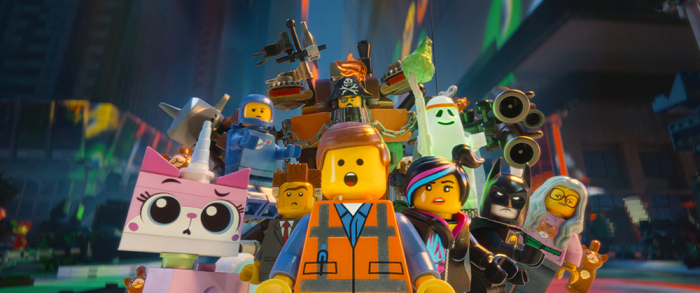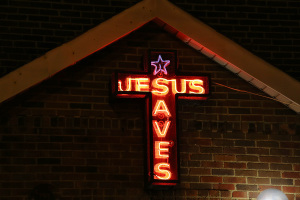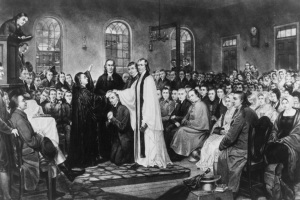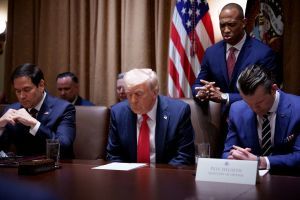5 Ways 'The Lego Movie' Hints at a Christian Worldview
Warning: This article contains spoilers

"The Lego Movie" has dominated the box office for three weeks in a row, and captured high praise from reviewers, but the ideas and themes it presents (many of them remarkably consistent with a Christian worldview) may very well rank as its highest accomplishment.
The film presents a light-hearted, adventurous atmosphere infectious for kids and adults alike. It features pop culture references to Batman, Gandalf from Lord of the Rings, and Dumbledore from Harry Potter. From a journey to "Cloud Coo-Coo Land," where "there's no government, babysitters, and no consistency," to the millionth floor of President Business' mansion, which hosts "a mysterious room called the 'think tank,'" the movie creates a world full of witty fun.
Infused throughout the light-hearted comedy run deeper themes about human (or should one say "Lego?") freedom and creativity, adventure, sacrifice, and even redemption. Below, follow five prominent themes that resonate with a Christian worldview.
1. David and Goliath, Challenging Earthly Power
The events in "The Lego Movie" take place in a dystopian society where the all-powerful ruler "President Business" dictates instructions for all Lego people to be happy. Entertainment consists of one TV show, "Where are My Pants?" Coffee is overpriced – $37 for a cup of decaf. TV screens across the city blast the ruler's happy promise "I've got my eye on you," and radios emit one song – "Everything is Awesome!" The main character, Emmet, has no individual ideas or preferences, due to societal conditioning.
A resistance forms against this monochrome life, led by the "Master Builders," who aim to break individuals out of this mold and enable them to create. The plot pits these innovators against an all-powerful tyrant, who controls history books and voting machines, and aims to lock all Lego figures into an eternal state of "perfection." Emmet, the hero with no character, must save the day.
In this way, "The Lego Movie" presents a struggle like that between David – a small boy with no inherent power – and Goliath – a great giant who threatens God's people. It also resonates with the Apostle Paul's declaration in Ephesians 6 that Christians "wrestle not against flesh and blood, but against principalities, against powers, against the rulers of the present darkness of this world."
2. Freedom and Creativity
The central plot revolves around Emmet's pursuit of freedom and creativity, which requires him to gather the master builders and defeat President Business. As Wyldstyle, whose real name is Lucy, tells the main character, "President Business got confused and built walls between the worlds and became obsessed with order." In order to keep everybody in their place, the villain prepares the ultimate weapon – the Kragle (Krazy Glue) – to stick all the Legos together in an eternal prison.
Emmet finds "the piece of resistance" – the cap to the Krazy Glue – the only weapon to stop President Business' evil plan. In the end, the master builders achieve their freedom, and teach the other Lego figures to build things on their own, without the restrictions of "the instructions."
Christians believe that God created Man "in His own image," that human creativity springs from God's likeness. Sin enslaves men, as Jesus declared in John 8:34, but Jesus offers freedom.
3. Sacrifice of the Main Character
In order to achieve this victory, Emmet sacrifices himself. In addition to gluing the Legos in place for all time, President Business' plan involves killing all the master builders by shocking them with a battery. As the clock counts down to zero, Emmet grabs the battery and jumps into "the infinite abyss of nothingness," sacrificing his life to save his friends.
As Jesus redeemed men from the slavery of sin through dying on the cross, Emmet frees his friends by hurling himself (along with the battery) into the abyss.
4. The Physical and Spiritual Worlds
When Emmet falls through this black hole, however, he does not die or cease to exist, but ends up in the human world, unconnected to the Lego sets above him. There, he sees the boy who is playing with Legos, and glimpses a larger world in which he is no more than a toy.
The Old Testament abounds with passages emphasizing the smallness and relative insignificance of man from God's perspective. Isaiah 40 declares that "the people are as grass," but Jesus offers new life – adoption as sons of the living God. "That is precisely what Christianity is about," C.S. Lewis writes in Mere Christianity. "This world is a great sculptor's shop. We are the statues and there is a rumor going around the shop that some of us are some day going to come to life."
"The Lego Movie" shows a world where human beings partake in the lives of Lego minifigures, just as God partakes in the lives of men and women. This world-within-a-world fits with the Christian understanding of God's transcendence and the separation between earth and heaven.
5. Father-Son Redemption
When Emmet leaves the Lego world and enters the human world, the audience understands a plot behind the Lego struggle. Finn (Jadon Sand) is playing with his father's old Legos, and his father (Will Ferrell, who also voices President Business) wants to glue the Legos together so his son will stop playing with them and so they will sit still in the way he built them. Eventually, Finn convinces his father to let him play with the Legos, and the father joins in.
Although the Legos did not sin and thereby earn the kind of death Finn's father wanted to give them, their story provides an allegory of Jesus' redemption. Jesus dies on the cross, satisfying God's wrath and judgment against mankind, and freeing them to live with God. Finn convinces his father to save the Legos, freeing them from the horrible fate of being glued together for eternity.





























